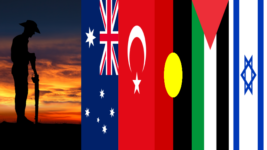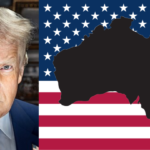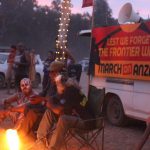As Global Conflicts Escalate, Lest We Remember the Futility of the ANZAC Myth

On 25 April 2025, Australia shall pause for its annual ANZAC Day public holiday, and the solemn phrase “lest we forget” will be repeatedly uttered, as it’s supposed to invoke a duty to honour and remember Australian soldiers who lost their lives in battle to secure our freedoms, and there’s also implied in those words the idea that in remembering the futility of war, it shall not be repeated.
The focus of ANZAC Day commemorations is the appropriately futile Battle of Gallipoli that saw Allied troops, including British, French, Australian and New Zealand soldiers, engaged in an eight-month-long invasion signified by trench warfare against Ottoman Turkish troops, after landing on the Gallipoli Peninsula in modern day Türkiye on 25 April 1915.
Gallipoli, known locally as the Battle of Çanakkale, saw ill-equipped yet exceedingly brave and unrelenting Ottoman Turkish troops triumph against all odds over invading British imperial forces, who sought to take the Dardanelles Strait before proceeding to Constantinople (modern day Istanbul) and thereby opening the way to potentially making Türkiye yet another British colony.
Lest we remember First Nations Frontier War fighters
ANZAC Day serves to commemorate all Australian military personnel that have fallen in any field of battle the nation has participated in, even the pre-federation Boer War in southern Africa.
Yet, it does not include and avoids mention of the Frontier Wars, which saw the First Peoples of this continent fight a war of resistance against British invaders. Indeed, in this respect, ANZAC day is more like “lest we remember”.
ANZAC is an acronym for Australian and New Zealand Army Corps, and the ANZAC legend holds local importance, as Australian men being led to their slaughter on behalf of British interests somehow serves to symbolises the sacrificial birth of the independent nation of Australia, as the final outcome of an earlier settler colonial project not unakin to Israel’s Gaza genocide and landgrab of today.
Sacrifice for Turkish freedoms
The Allies lost 44,150 military personnel following the 25 April 1915 securing of several beachfront areas along the Gallipoli Peninsula in an attempted invasion of Ottoman territory, while the Ottoman Empire lost 86,692 in defence of country.
As for Australian troops, 8,709 lost their lives in an eight-month-long stalemate, and 57,084 Turkish troops died, prior to Allied pullout on 19 January 1916.
At dawn services across this country on Friday, Australian troops who lost their lives in battle will be commemorated, in the understanding that the freedoms all Australian citizens and residents enjoy today were won by the sacrifices made by these young men and women. But that’s as far as that idea will be pressed, as on further scrutiny, it’s a little hard to ascertain which freedoms these are.
Exactly what was secured by the sacrifice of close to 9,000 Australians on a beach in someone else’s country has always been hard to define. And this lack of certainty around which freedoms have been or will be secured by our involvement in Korea, Vietnam, the Gulf War, the Iraqi War, Afghanistan and the coming war on China, is completely beyond grasp as our freedoms haven’t been under threat.
Of course, World War II is a different story, as Australia was involved in the Allied battle against the threat of European fascism, which is an idea that has always held its own, that is until of late, when casting a gaze towards increasingly fascistic Israel and the USA.
The truth of the Battle of Gallipoli/Çanakkale is that the Ottoman Turkish troops held off their colonial invaders for close to a year to secure the freedoms and lifestyles of those living in modern day Türkiye, as if so many young Turkish men had not made that ultimate sacrifice – a loss that doubled that of the invaders – the imposition of the English language may have become a reality.
A dependent Australian identity
Those fighting on behalf of this country in World War I served as part of the Australian Imperial Force, while our participation in Gallipoli has since served as one of the nation’s founding myths and has further acted to define an Australian identity, that involves the characteristics of bravery, ingenuity, endurance and comradeship, or ‘mateship’, which was forged in the crucible of battle.
Whilst the British have been criticised for leading Australian troops to their slaughter in Gallipoli, the truth is that the UK, which established the various colonies that joined to become Australia, sent many more of its own soldiers to their death, 21,255 to be exact, on the Gallipoli Peninsula, in an operation that turned out to be a horrendous blunder for the Allies.
But this strategic error appears to be key to the Australian psyche, and the Battle of Gallipoli, along with broader Australian participation in World War I, continued to set a precedent, the foundations of which had already been established during the Boer War, that sees Australia following imperial powers into wars for their strategic purposes, in order to shore up protection for us.
Following the 1942 World War II Fall of Singapore, however, our imperial master, the then failing British Empire, withdrew from Asia, which left Australia without an imperial protector, and it was at this time that our nation turned to the United States as a new imperial master.
This relationship was then cemented under the 1951 ANZUS Treaty, which unlike the 1949 NATO Treaty does for the European nations that are a party to it, does not guarantee that Washington would step in to defend an Australia under attack.
The concerted effort to forget
On 25 April, as pubs and clubs across the continent that was invaded by the British commencing in 1788, will fill with locals, who, for one day only, are allowed to partake in the war time gambling game of Two-Up, while any remembrance of “the diggers”, as local troops are also known, ultimately, turns into a celebration of brave fighters protecting this nation from foreign threats.
On Friday, the official Anzac Day veterans’ march will also take place on Ngunnawal Country in Canberra, and it will be followed by the Australian Frontiers War march, which will take the same route as the official parade in order to commemorate First Nations’ defence of Country against the British invaders in much the same way as Ottoman Turkish troops did during the Battle at Gallipoli.
Led by Aboriginal and Torres Strait Islander peoples, the Frontiers Wars march is not permitted to join the Anzac Day parade, and recognition of Indigenous defence of land in the face of British invaders is neither permitted at the Australian War Memorial.
Yet, these are the only wars – the only genocidal wars at that – that actually occurred on these lands that have involved Europeans.
And as Australia takes Friday to remember a futile battle of the past, the people will be encouraged to forget that apartheid Israel is continuing the mass murder of Palestinian civilians in Gaza, while the freedoms we have fought alongside the USA to maintain since World War II, are busily being stripped like never before from the American public by its own authoritarian Trump administration.







